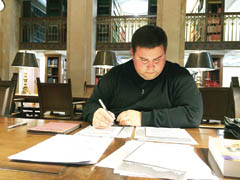
MUNDELEIN—German theologian Romano Guardini “was a promotor of Catholic identity in all its fullness,” says Father Jonathan Bakkelund, a Rockford Diocese priest who is learning German in order to translate one of Guardini’s books into English.
Guardini was concerned with “thick liturgy,” Father Bakkelund says, describing that as asking “how do we fully invest ourselves in the worship of God” instead of focusing on the nuts-and-bolts (music, vestments, candles) of “thin liturgy?”
The book is titled “Liturgische Bildung” — in English: “Liturgical Formation.” It is a 1923 follow-up to Guardini’s oft-read 1918 book titled “Spirit of the Liturgy.” Both explore the theologian’s propositions for transforming Catholic worship so that liturgical prayer will transform worshippers.
“Liturgy should not be subject to the whims of a few,” Father Bakkelund says as he explains the author’s approach.
Liturgy “is not created,” he explains, “it is revealed and given to us by God … It is not about me worshipping Jesus, it is about the community worshipping God together.”
Silence in the liturgy is a big theme for Guardini, this new translator explains.
“Not utter silence when there is no sound … (but the) use of silence in that we don’t all have to be speaking at the same time.”
Guardini “would call sacrifice an essential element to the liturgy,” Father Bakkelund says, using as an example individual temperament.
“If you are very outgoing, there are points (in the Mass) where you have to go within,” he explains. “If you are introverted, there are times when you have to go without and sing or shake hands. (Sacrifice) is an element where we have to give something up to worship God together.”
Guardini, he adds, “teases those themes out” in the second book, currently available only in its original German and in Italian.
A number of Guardini’s spiritual books are available in English, Father Bakkelund says, naming a few better-known titles: “The Art of Praying,” “Preparing Yourself for Mass,” and “The Rosary of Our Lady.”
But at this point in history, German-English writers are devoted to translating the works of a certain Pope-Emeritus author, Cardinal Joseph Ratzinger.
The expensive process of translation has, at the moment, passed by “Liturgische Bildung” — except for Father Bakkelund.
As diocesan director of the Office of Divine Worship, this young priest’s enthusiasm for purposeful liturgy done well led to his receiving permission from Bishop David Malloy to spend last summer in an intense German study program at the Goethe Institut in Munich and now to continue German studies at the Chicago campus of that same institute a couple of days a week.
When he is not in class, or assisting at St. Elizabeth Ann Seton Parish in Crystal Lake, or working to prepare special liturgies as director of Divine Worship and Master of Ceremonies for the diocese, Father Bakkelund can be found in the library at Mundelein seminary, translating “this little guy” of approximately 100 pages. “I’m never bored,” he says with a note of satisfaction in his voice.
He estimates the translation will take him about a year to complete.
“We are a couple of months ahead of schedule,” he says happily. “A couple of publishers are excited about the project, as long as it turns out well. My hope is that it soon can be in the hands of seminarians, priests and lay faithful who have an interest in liturgy.”
Father Bakkelund’s extended hope is that Guardini’s teachings in “Liturgical Formation” will soon be at work like “a mustard seed” in transforming parishes.
“If we put our whole selves, to the best of our ability,” into all that happens at Mass, he says, “then God divinizes our souls.
“I took up the project because I believe (Guardini) is right (and has valuable) ideas of how we can be more actively engaged in worship … He spent his life trying to teach the faithful what the liturgy is (and) he was very successful with it during his lifetime.
“If we’d take his advice, it could have a big impact.”














